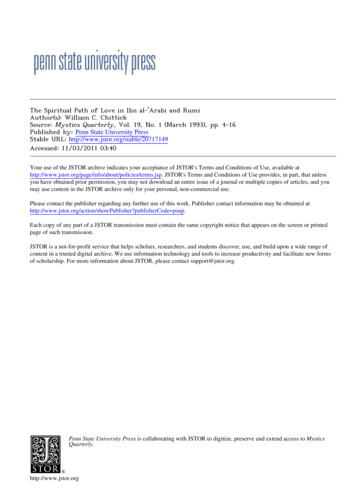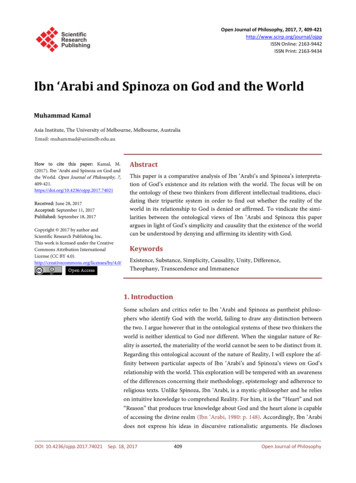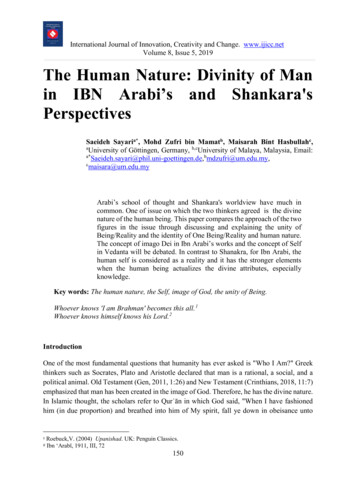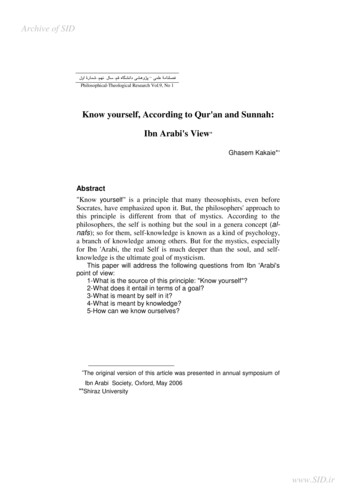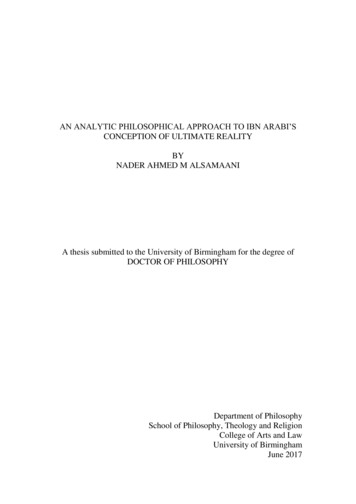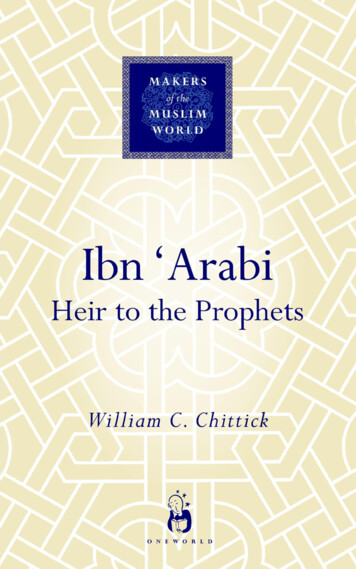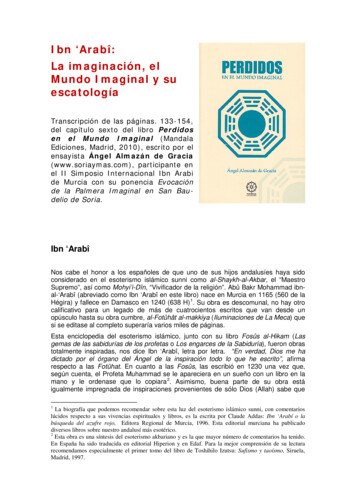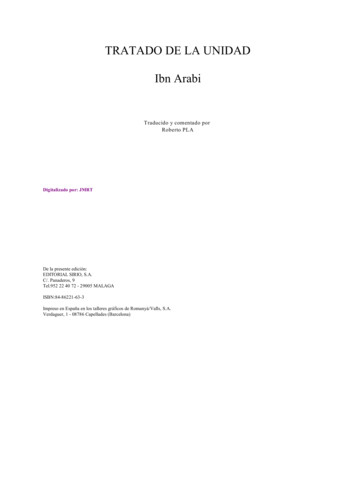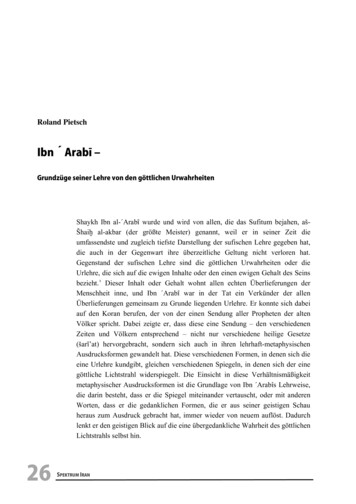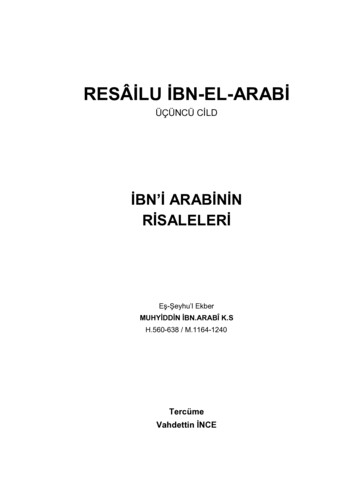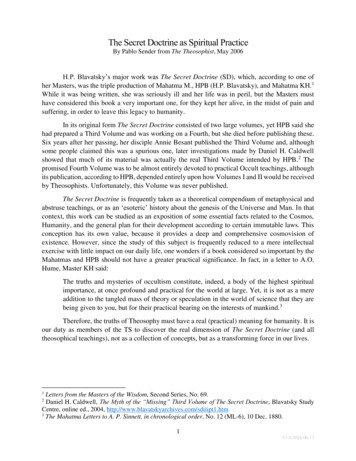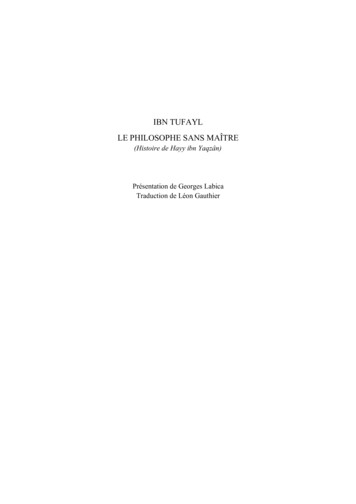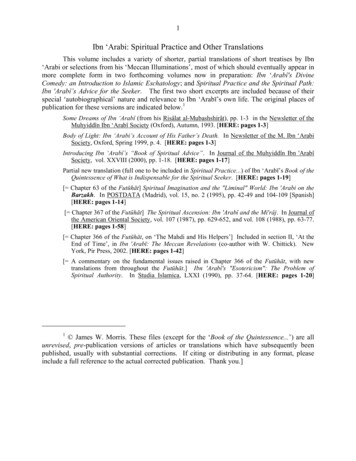
Transcription
1Ibn ‘Arabi: Spiritual Practice and Other TranslationsThis volume includes a variety of shorter, partial translations of short treatises by Ibn‘Arabi or selections from his ‘Meccan Illuminations’, most of which should eventually appear inmore complete form in two forthcoming volumes now in preparation: Ibn ‘Arabî's DivineComedy: an Introduction to Islamic Eschatology; and Spiritual Practice and the Spiritual Path:Ibn 'Arabî’s Advice for the Seeker. The first two short excerpts are included because of theirspecial ‘autobiographical’ nature and relevance to Ibn ‘Arabī’s own life. The original places ofpublication for these versions are indicated below.1Some Dreams of Ibn ‘Arabî (from his Risâlat al-Mubashshirât), pp. 1-3 in the Newsletter of theMuhyiddîn Ibn ‘Arabî Society (Oxford), Autumn, 1993. [HERE: pages 1-3]Body of Light: Ibn ‘Arabi’s Account of His Father’s Death. In Newsletter of the M. Ibn ‘ArabiSociety, Oxford, Spring 1999, p. 4. [HERE: pages 1-3]Introducing Ibn ‘Arabî’s “Book of Spiritual Advice”. In Journal of the Muhyiddîn Ibn 'ArabîSociety, vol. XXVIII (2000), pp. 1-18. [HERE: pages 1-17]Partial new translation (full one to be included in Spiritual Practice.) of Ibn ‘Arabī’s Book of theQuintessence of What is Indispensable for the Spiritual Seeker. [HERE: pages 1-19][ Chapter 63 of the Futūhāt] Spiritual Imagination and the "Liminal" World: Ibn 'Arabi on theBarzakh. In POSTDATA (Madrid), vol. 15, no. 2 (1995), pp. 42-49 and 104-109 [Spanish][HERE: pages 1-14][ Chapter 367 of the Futūhāt] The Spiritual Ascension: Ibn 'Arabî and the Mi'râj. In Journal ofthe American Oriental Society, vol. 107 (1987), pp. 629-652, and vol. 108 (1988), pp. 63-77.[HERE: pages 1-58][ Chapter 366 of the Futūhāt, on ‘The Mahdi and His Helpers’] Included in section II, ‘At theEnd of Time’, in Ibn 'Arabī: The Meccan Revelations (co-author with W. Chittick). NewYork, Pir Press, 2002. [HERE: pages 1-42][ A commentary on the fundamental issues raised in Chapter 366 of the Futūhāt, with newtranslations from throughout the Futūhāt.] Ibn 'Arabî's "Esotericism": The Problem ofSpiritual Authority. In Studia Islamica, LXXI (1990), pp. 37-64. [HERE: pages 1-20]1 James W. Morris. These files (except for the ‘Book of the Quintessence.’) are allunrevised, pre-publication versions of articles or translations which have subsequently beenpublished, usually with substantial corrections. If citing or distributing in any format, pleaseinclude a full reference to the actual corrected publication. Thank you.]
1Some Dreams of Ibn 'ArabiThe following dreams are among the eighteen recorded in the Shaykh's short "Epistle ofGood Tidings" (Risâlat. al-Mubashshirât),1 whose title alludes to a famous hadith where theProphet explains that these "'good tidings.are the dream of the muslim, either what that personsees or what is shown to them, which is one of the parts of prophecy.' .So I decided to mentionin this section some of what I have seen in dreams that involves a benefit for others and pointsout for them the means for reaching the Good, since there is no need to mention what onlyconcerns myself." (When I was young), before I had acquired any religious learning, a group of mycompanions were strongly urging me to study the 'books of opinions' [Ibn 'Arabi's disparagingterm for the books of fiqh ('Islamic law'), as opposed to the collections of hadith], at a time whenI had no knowledge of them or of hadith. Now in a dream I saw myself as though I werestanding in a wide open space, with a group of people all around me with weapons in their handswho wanted to kill me; there was no place of refuge to which I could turn. Then I saw a hill justin front of me, and God's Messenger was standing on it. So I took refuge with him, and he puthis own armor on me and hugged me with an extraordinary embrace, saying to me: "O myfriend, stick with me, so you will be safely in peace!" Then I looked for those enemies, but Ididn't see a single one of them on the face of the earth. So from that time on I've busied myselfwith studying hadith. I saw in a dream that I was at the Sacred Shrine in Mecca, and it was as though theResurrection had already begun. It was as though I was standing immediately in front of myLord, with my head bowed in silence and fear of His reproaching me because of my negligence(tafrît). But He was saying to me: "O My servant, don't be afraid, for I am not asking you to doanything except to admonish My servants. So admonish My servants, and I will guide the people(al-nâs) to the straight path." Now when I had seen how rare it was for anyone to enter the Path1Translations based on the text of the Epistle included in Yusuf al-Nabhani's Sa'adat al-Darayn fial-Salat 'ala Sayyid al-Kawnayn (Beirut, n.d.), pp. 472-478 (copy thanks to Prof. Denis Gril). The Epistleis No. 485 in O. Yahya's Histoire et Classification de l'oeuvre d'Ibn 'Arabi (Damascus, 1964), vol. II, p.394, where it is noted that the work is mentioned in both Ibn 'Arabi's Fihris (no. 71) and his later Ijaza(no. 76). [Subject treated in more detail in chapter 188 of al-Futûhât al-Makkîya, II, 375-380 in Beirutedition.]
2of God I had become spiritually lazy. And that night I had resolved only to concern myself withmy own soul, to forget about all the other people and their condition. But then I had that dream,and the very next morning I sat down among the people and began to explain to them the clearPath and the various evils blocking the Path for each group of them, whether the learned jurists,the 'poor' (al-fuqarâ') the Sufis or the common people. So every one of them began to opposeme and to try to destroy me, but God helped me to overcome them and protected me with ablessing and lovingmercy from Him. (The Prophet) said: "Religion is admonishment (or 'straightadvice,' al-nasîha), for God, for the leaders of the Muslims, and for the common people amongthem," as is mentioned in Muslim's Sahîh. I saw (in a dream where) it was as though I was in Mecca with the Messenger of God,in the same dwelling. There was an extraordinary connection between him and me, almost asthough I was him and as though he were me. And I saw that he had a little son, such thatwhenever anyone came to see (the Prophet), he would have that little boy go out with him so thatthe people might be blessed by him and come to know him. It was as though that little one had avery special standing standing with God. Now we were all sitting there when someone knockedat the door, and the Messenger of God went out to see them, taking the little one along with him.Then he came back to see me and said to me: "God has ordered me to go to Medina and pray theevening prayer there." And I [the Arabic here leaves it unclear whether this is still the Prophet,speaking of the little boy, or Ibn 'Arabi now speaking of the Prophet] never leave him and nevertake my eye off of him; it is as though I were his very essence, for I am not him, but I am notother than him.Now while he was between Mecca and Medina, suddenly he saw a tremendous gooddescending from the sky, and he said: "O Gabriel, what is this tremendous good, whose like Ihave not seen?" Then he said: "It descended from the loftiest paradise upon those keeping thenight-vigil [al-mutahajjidûn: see Qur'an 17:79]. And how is it that you are among them?!" ThenGabriel began praising these keepers of the night-vigil to God with such praises as I had neverheard before, and (the Prophet) was among the loftiest and noblest of them. Then I realized thatthis was all in regard to me and that his saying "How is it that you are among them?" wasaddressed in reference to me, and I woke up.
3 I entered Seville to see the scrupulous, righteous Shaykh Abu 'Imran b. Musa b. 'Imranal-Martuli,2 and I informed him about a matter which made him happy and which he took asgood tidings. So he said to me: "May God give you good tidings of the Garden (of Paradise), asyou have given me good tidings!" Not many days had gone by when I saw in a dream one of ourcompanions, among those who had died, and I said to him: "How are you doing?" So hementioned something good (regarding his own state), in the course of saying a great deal andtelling a long story. Then he said to me: "God has already given me the good news that you aremy companion in the Garden!" So I said to him: "This is (all taking place) in a dream. Give mea sign of (the truth of) what you are saying!" Then he replied: "Yes, tomorrow at the noonprayer the Sultan will send someone to look for you in order to imprison you. So watch out foryourself!"Then I woke up, and there was nothing at all to indicate anything like that (was about tohappen). But when I was praying at noon, suddenly the request came from the Sultan. So I said(to myself): "The dream was right!," and I hid out for fifteen days, until that (royal) request wascancelled. Now this is (an example of) the spiritual blessing (baraka) of the petitionary prayers(du'a) of the righteous (the salihin). I saw while I was sleeping as though God was calling out to me, saying to me: "O Myservant, if you want to be close to Me, honored and enjoying delight with Me, then constantlysay 'My Lord, cause me to see, that I might look upon You!'3 Repeat that for Me many times."2See the account of this shaykh in Sufis of Andalusia (trans. R. Austin), pp. 87-91 (includingaccounts from both Ruh al-Quds and al-Durrat al-Fakhira); the first account begins with more detail onthe same incident alluded to at the beginning of this story.3Rabbî ârinî anzur ilayk: this formula of dhikr is very close to a famous prayer of the Prophetrecorded among the hadith: "O my God, cause us to see things as they really are!" (allâhumma ârinâ alashyâ' kamâ hiya).
1Body of Light: Ibn ‘Arabi’s Account of His Father’s DeathIn chapter 35 of the Meccan Illuminations,1 Ibn ‘Arabi gives a fascinating account of hisfather’s death—and at the same time, of his spiritual state and role in his life—which deservescloser attention, especially in light of the growing interest in the Shaykh’s own biography. Thislong and instructive chapter is entitled “Concerning the Inner Knowledge of the Person Who HasRealized the Waystation of the Breaths, and His/Its Secrets After His Death.” Since it is clear bythe end of this chapter (where the anecdote of his father’s death is actually retold) that Ibn ‘Arabiconsiders his own father to have become one of these particularly accomplished “knowers,” it ishelpful to start by quoting the opening poetic lines and introductory prose of this chapter:“The (true) servant is the person whose state already while living / is likehis state after the death of the body and spirit.The (true) servant is the person who, while still in a state of veiling (by thebody) / was already a light, like the sun’s illuminating the earth.For the state of death is not accompanied by any pretense, / just as life hasits open pretensions (to “lordship” and divinity)” .“You must know—May God inspire you with the Holy Spirit!--that thisperson who has realized the waystation of the Breath, whoever that person maybe, that their state after their death is different from the states of the others whodie. So we will begin by mentioning the different ways that the people of Godtake their knowing from God , and then we will mention their ultimate fate andthe effects of what they take (from God) upon their essential realities.”Near the end of this chapter, Ibn ‘Arabi goes on to develop a general principle regardingthese “People of the Breaths” which has wide-ranging practical consequences with regard to thelater “cult of the saints”—in Islam and other world religions--and the realities underlying thecomplex influences, guidance and mediation of those holy figures: “Therefore among their statesafter death is that they are living with that essential Life—that ‘Life of the divine Breath’ (al-1353-355.All passages quoted from Kitāb Al-Futuhāt al-Makkīya (O. Yahya ed.), vol. III, pp. 333 and
2hayāt al-nafsīya) through which every creature is praising (God).” By way of illustration, hementions several cases of the way the influences of the worship and devotion of a saint orprophet continue to be manifest in their places of worship (and at their tombs) long after theirdeath. In one of those illustrations, someone who inadvertently profanes the shrine of BayazidBastami finds his clothes “burning” him without any visible fire. In the other case, Ibn ‘Arabirecalls how the Prophet, during his celebrated spiritual Ascension, saw Moses praying at histomb, while at the same time they had their famous conversations in the heavens concerning theproper number of canonical prayers. Then he continues:“So among the states of this person (who knows the divine Breaths) aftertheir death are things like these: there is no difference in respect to such a personbetween their life and their death, for they were already in the form of a deadperson during the time of their life in this world, in the state of death. So Godmade them, in the state of their death, like the person whose state is alive.”A second remarkable sign of those who realize this “Station of the Breaths” is theapparent incorruptibility or agelessness of their physical body:“And among the attributes of the master of this spiritual station (of theBreaths) after their death is that when someone looks at their face, once they aredead, he will say that person is surely alive--even though the lack of pulseindicates they are dead! So the person who sees them is bewildered.Now I saw that (happen) with my father—God have mercy on him!--, sothat we almost didn’t bury him, we were so unsure, because his face seemed soalive, even though his lack of pulse or breathing indicated he was dead. Somefifteen days before he died, he told me that he was dying and would die on aThursday, and that is how it was. When the day of his death came—and he wasterribly ill—he sat up without any support and said to me: ‘O my son, today is t
Ibn ‘Arabi: Spiritual Practice and Other Translations This volume includes a variety of shorter, partial translations of short treatises by Ibn ‘Arabi or selections from his ‘Meccan Illuminations’, most of which should eventually appear in more complete form in two forthcoming volumes now in preparation: Ibn ‘Arabî's Divine Comedy: an Introduction to Islamic Eschatology; and .
